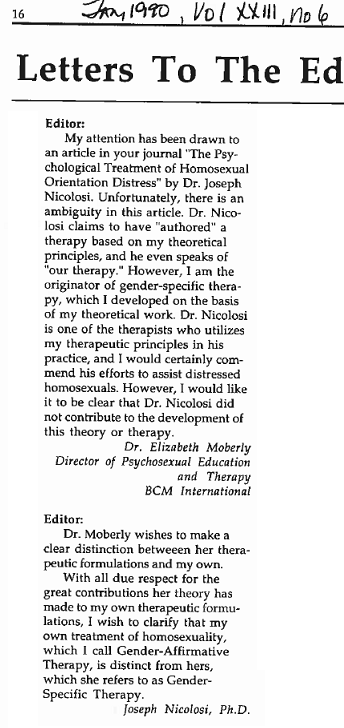Once upon a time, I wrote frequently about sexual orientation, psychotherapy, and the culture wars that have raged about those topics. A review of my blog posts since I started in 2005 would be like reading a history of the ex-gay movement, reparative therapy, sexual orientation change efforts and many related matters. Even though general interest has diminished about gay change efforts since the close of Exodus International, I have some stories still to explore.
Today, I want to post a brief letter to the editor exchange between Elizabeth Moberly and Joseph Nicolosi. While I can’t publish them, I also have some letters involving Dr. Moberly and the Exodus International board which reveals a six-year feud between Moberly and Nicolosi over who founded reparative therapy. Moberly strongly asserted that Joe Nicolosi plagiarized portions of her work and took credit for the development of reparative therapy which she believed rightly belonged to her.
First, here is the letters to the editor of the California Psychologist (Jan, 1990).

I started to explore this several years ago but got sidetracked. I think the founding of modern day reparative therapy is an interesting historical issue. Some time ago, I asked a former Exodus board member (who desires anonymity) about the rift. The individual said the dispute was “common knowledge” among Exodus people. In essence, my source said
Elizabeth believed that Joe’s reparative therapy concept belonged to her as reported in her research work in Psychogenesis and Homosexuality: A New Christian Ethic, and that Joe had not given sufficient acknowledgment to her work; and (2) that Joe believed he had referenced her work adequately and had taken her concepts and built upon them sufficiently to justify reporting on his own work in his book Reparative Therapy.
This individual was on the Exodus board at the time and made contacts with both Nicolosi and Moberly to try to resolve their differences. According to my source, the effort was unsuccessful. They did not come to unity over the issues. In 1996, Moberly left the ex-gay movement to return to England to conduct research into alternative treatments for AIDS and cancer. I tried to contact her in 2011 but received no reply.
Moberly’s books on reparative therapy were published in the early 1980s. According to Moberly, Nicolosi was introduced to her work via a client and he began using her approach in the late 1980s. Moberly was exasperated that Nicolosi published his first book on the subject in 1991 without giving her what she felt was sufficient credit. Nicolosi did in fact cite one of Moberly’s books in the 1991 book and gave her credit for the concept of defensive detachment. However, Moberly felt that was insufficient. She pulled out of speaking for at least one of the Exodus conferences because she believed Exodus should not have promoted Nicolosi’s book.
I haven’t made up my mind yet what I think about it and am still researching it. Clearly she came first with the core concepts of reparative therapy (i.e., homosexual behavior represents a reaction to a same-sex parent wound during development leading to a reparative drive to connect with same-sex love objects). On the other hand, Nicolosi did cite at least one of her books and specifically referred to her in his book.
As to the specific question — who founded reparative therapy? — I think the answer must be Elizabeth Moberly. She wrote first about all of the key concepts and described the kind of therapeutic relationship that reparative therapists, including Nicolosi, have promoted. Without question, Nicolosi popularized reparative therapy through his books, the organization he co-founded (NARTH), and via the vocal support of Exodus International and Focus on the Family. His appearance with James Dobson on the Focus on the Family radio show and subsequent role as featured speaker at FoF’s Love Won Out conferences solidified Nicolosi’s enduring role as representative of reparative therapy.
As time permits, I will post more information from the archives on this topic in the coming weeks.
